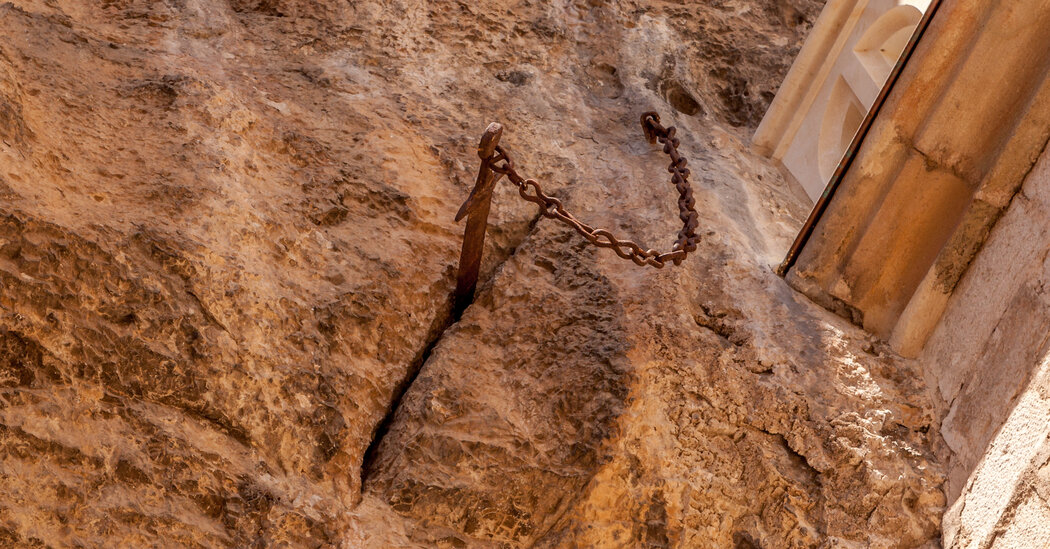According to legend, a sword given by God to Roland, an army commander under Charlemagne in the 8th century, was so powerful that Roland’s final mission was to destroy it.
When the blade, called Durandal, proved indestructible, Roland threw it as far as he could, traveling over 100 miles before slicing through the side of a cliff in the medieval French village of Rocamadour.
That sword, so the story goes, had been stuck in the stone for nearly 1,300 years and became a landmark and tourist attraction in Rocamadour, a tiny village in southwestern France about 110 miles east of Bordeaux. So residents and officials were stunned when they discovered late last month that the sword had disappeared. according to La Dépêche du Midia French newspaper.
A French national police officer in Cahors, a town 30 miles (48 kilometers) southwest of Rocamadour, said the sword disappeared sometime after sunset on June 21 and that authorities launched an investigation after a passerby reported it missing the next morning.
The officer, who declined to be named, stressed that the sword was “a copy” but acknowledged it had symbolic meaning.
For further questions, he referred the republic’s public prosecutor’s office in Cahors, which did not immediately respond to a request for comment.
The mayor of Rocamadour, Dominique Lenfant, told La Dépêche that the sword “is a public asset that belongs to the state.”
“We will miss Durandal,” she said. “It was part of Rocamadour for centuries. There is no guide who does not show it during a visit. Rocamadour has been robbed of a part of itself, even if it is only a legend. The fate of our village and this sword are linked.”
For most Americans, King Arthur’s Excalibur is a more recognizable example of a sword set in stone. But the Durandal myths are popular in France, thanks to the famous 11th- or 12th-century French poem “The Song of Roland.”
The poem is partly set during the Battle of Roncevaux Pass in 778 AD, in which Charlemagne’s men, led by Roland, who had been fighting against Muslims in Spain, found themselves severely outnumbered by enemy forces. According to the poem’s fictional account, Roland and his sword fought bravely, but he was seriously wounded and tried in vain to destroy the blade before his death.
According to “The Song of Roland,” Roland hid the knife beneath his dying body.
But guides in Rocamadour have encouraged visitors to come to the town — a postcard-worthy collection of castles carved into a steep mountainside — and see the blade for themselves: it protrudes from a cleft in the rock face, some 30 feet (9 meters) into the air.
The story of how Durandal ended up in Rocamadour, 150 miles northeast of where Roland died, has its skeptics.
A British historian, Richard Barber, wrote in 2020 that the replica sword was placed in Rocamadour by an official who wants to stimulate tourism in the 1780s. And others, including Helen Solterer, a professor of romance studies at Duke University, called the sword “a copy.”
But Durandal was still a fixture in Rocamadour, and its absence was felt throughout the region.
“I can certainly imagine that this is a great loss for Rocamadour, as it was one of the most legendary attractions of the medieval village,” said Paola Westbeek, a travel journalist who has visited Rocamadour several times.
Adding to the mystery of the disappearance is its timing during a contentious political cycle. After President Emmanuel Macron called snap elections, France’s far-right party dominated the first round of voting.
“The far-right camp would code the sword as a defining piece of French national identity,” Ms Solterer said.
“The Song of Roland” is cited by nationalist groups for its message that Muslims are the enemy and that Muslim immigrants are taking over France, said Ada Maria Kuskowski, an assistant professor of history specializing in medieval history at the University of Pennsylvania.
“The sword that Roland tried so hard to keep out of the hands of Muslims in order to preserve honor, Christianity and Frenchness,” she said, “is now gone.”
But the theory that this sword could have been stolen to send a political message is just speculation. This could turn out to be a simple prank, Ms. Solterer said.
Where the sword is, is anyone’s guess. And while police continue to turn over every stone, the mystery of Durandal continues — 1,246 years and counting.
Willem Lamb contributed to the reporting and Susan C. Beachy contributed to research.


